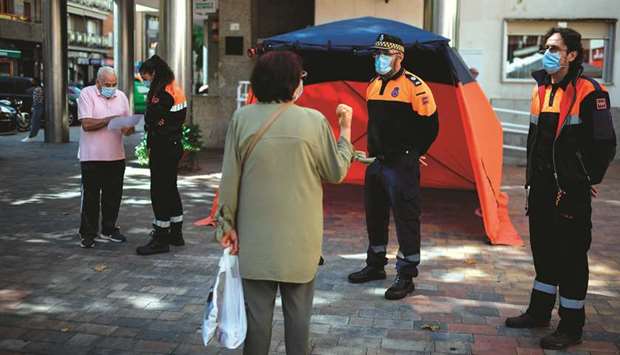Madrid’s regional government chief has requested the army’s help in fighting the coronavirus surge in the Spanish capital, where local authorities ordered a partial lockdown of some poorer districts, prompting protests.
At the height of the first wave of the pandemic in March-April, Spain deployed thousands of troops to help civilian authorities contain the outbreak.
The coronavirus causes the Covid-19 respiratory disease.
A recent spike in infections, peaking at over 10,000 per day, took cumulative cases above 670,000 as of Monday, the highest in Western Europe, while the number of deaths from the Covid-19 respiratory disease in Spain stood at 30,663.
“We need help from the army for disinfection ... and to strengthen local police and law enforcement,” Isabel Diaz Ayuso told a news briefing after meeting Prime Minister Pedro Sanchez in an attempt to reduce contagion in Spain’s worst-hit region.
She also requested that makeshift hospitals be set up again, about three months after they were decommissioned when Spain emerged from its strict lockdown having reduced contagion rates.
Sanchez said the central and regional governments would determine the size of the military and police reinforcements later at a meeting, the first of a series of meetings on tackling the situation in the capital region.
Meanwhile, residents in the southern district of Vallecas, one of the areas where a partial lockdown took effect yesterday, were upset but resigned to the curbs as police stopped cars getting in and out of the neighbourhood.
Ayuso’s government had ordered mobility restrictions in areas where a total of 850,000 people live, sparking discrimination complaints and protests.
Madrid authorities said they had chosen those areas because Covid-19 transmission levels there exceeded 1,000 per 100,000 people.
But some residents complained that the measures, which allow people to go to work or school, failed to address the problem of an overcrowded transport system where the virus could spread fast.
“It is horrendous and bad, because it is discrimination. They should regulate the metro, (where) we are packed like sardines,” Marina, a Vallecas housewife, told Reuters.
Local businesses were starting to feel the pinch.
“We had no business this morning, it is empty,” said John Michael Montana Sanchez, who manages three restaurants on the same street in Vallecas.” I have 16 employees and I will start giving them holidays as I don’t know what will happen next.”
Meanwhile, French health authorities reported 5,298 new confirmed Covid-19 cases yesterday, down from the previous day’s increase of 10,569, while intensive care admissions were on the rise.
There are traditionally fewer confirmed cases on Mondays, as less testing is carried out over the weekend.
The number of people in France who have died from Covid-19 has risen by 53 to 31,338, the health ministry said.
The cumulative number of cases stands at 458,061.
The rolling seven-day count of Covid-19 hospital admissions rose to 4,103 from 3,894 on Sunday, according to the latest French data, with intensive care admissions at 638 against 593 on Sunday.
Tighter restrictions will be imposed in the French city of Lyon from today to counter a sharp increase in new coronavirus cases and a surge in intensive care admissions, local authorities said.
The new rules for Lyon, France’s third largest city, follow similar measures in Marseille, Bordeaux and Nice as the coronavirus resurges across the country and the testing system buckles under heavy demand.
The incidence rate in Lyon had risen to 213 for every 100,000 inhabitants, the regional health authority leader said, while 25% of all intensive care beds in the Rhone department, which encompasses Lyon, were now occupied by Covid-19 sufferers.
“There is pressure on our hospitals,” Jean-Yves Grall said.
The hospital system in the wider Auvergne-Rhone-Alpes region was likely to trigger its crisis ‘White Plan’ in the near future, he added.
Greece meanwhile reported 453 new cases of Covid-19 infections yesterday, a new daily record since the start of the coronavirus outbreak in the country.
The latest jump in cases brought the total number of infections in Greece to 15,595 and 344 deaths since its first case surfaced in late February.
Of the new cases, 184 were due to an outbreak of Covid-19 infections at Greece’s biggest migrant camp on Lesbos island, with 174 recorded in the greater Athens area, health authorities said (see accompanying report on the right).
In a bid to stem the spread of the coronavirus following a steady increase in coronavirus cases, Greek authorities tightened restrictions for two weeks effective from yesterday.
Switzerland reported yesterday that the number of people testing positive for infections with the new coronavirus has risen by 1,095.
Data from Switzerland’s public health agency yesterday shows 50,378 cases, up from 49,283 on Friday.
The death toll increased to 1,770 from 1,765 people.
The agency has stopped reporting new cases on weekends.
The country reported its first confirmed case in late February.
New cases peaked at 1,464 on March 23 and had dwindled to as few as three on June 1.

Civil Defence members inform residents on the new restrictions imposed in the neighbourhood under partial lockdown of Usera, in Madrid, early yesterday.
